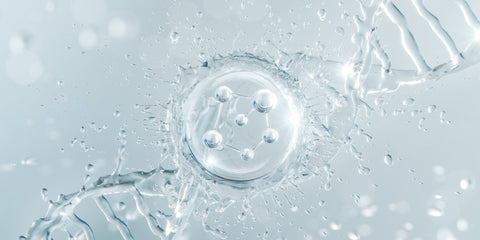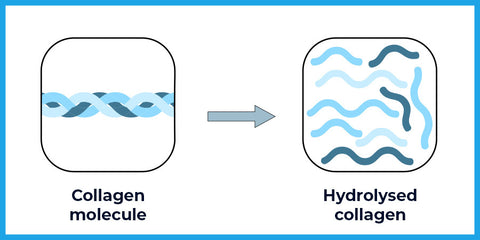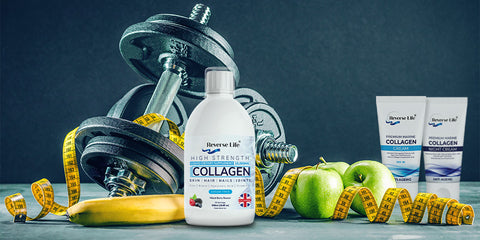Did you know collagen deficiency can cause unpleasant physical signs and symptoms? Low collagen levels have been linked to joint pain, wrinkles, reduced skin elasticity, and poor skin health. But don't worry - there are ways to counteract these effects with regular supplementation of high-strength hydrolysed collagen from Reverse Life. This blog post will give you a complete overview of the surprising signs of collagen deficiency and discuss the benefits you can expect when supplementing with this essential protein.
Signs And Symptoms That You Are Collagen Deficient

Do you ever feel like your skin is looking dull? Or find yourself getting more wrinkles than you used to, even though you're not that old? If so, you could be experiencing early signs of a collagen deficiency.
Believe it or not, most of us don't have enough collagen in our bodies! FACT! And while this isn't something we hear being discussed very often, it does have real consequences for our health and beauty.
So what does collagen deficiency look like? And why are so many people suffering from it today? Is it possible to prevent or even reverse the negative side effects with simple lifestyle changes?
First Up, What Exactly Is Collagen?

Ever wondered about the secret behind the plumpness of a baby's skin or the strength in an athlete's muscles? It's collagen, the unsung hero holding our bodies together!
This superstar protein is crucial for keeping our skin firm, bones strong, and joints flexible. But like a car running low on fuel, our bodies can suffer when collagen levels dip, showing signs like sagging skin, aching joints, and brittle nails.
That's because collagen is the most abundant protein in the human body and plays a crucial role in maintaining the structure and integrity of our skin, bones, muscles, tendons, and ligaments.
It's essentially the "glue" that holds our bodies together.
What Is Hydrolysed Collagen, And How Does It Differ From Regular Collagen?
Think of hydrolysed collagen as the turbo-charged cousin of regular collagen. It's been through a special process called hydrolysis, which is like a makeover for those large collagen molecules, breaking them down into smaller, more manageable peptides. The result? A collagen that's ready to be absorbed and put to work by your body faster than you can say "Reverse Life."
Just like a VIP pass at a concert, these smaller peptides get easy access to your body, making hydrolysed collagen a superstar in the world of supplements and skincare products. And the benefits are music to our ears! We're talking skin so elastic it could bounce back a rubber ball and joints feeling like they've had a spa day, every day. When it comes to health and beauty, hydrolysed collagen is your backstage pass to feeling and looking great with Reverse Life.
Early Signs Of Collagen Deficiency To Look Out For

A collagen deficiency can lead to various signs and symptoms, including:
Skin Changes: One of the first signs of collagen deficiency is changes in your skin. Your skin may lose its elasticity, leading to sagging, wrinkles, and dryness.
Joint Pain: Collagen helps maintain the health of your cartilage, which is the tissue that protects your joints. A decrease in collagen can lead to joint pain and conditions like osteoarthritis.
Weak Nails, Hair, and Teeth: Collagen is a critical component of nails, hair, and teeth. A deficiency can lead to brittle nails, hair loss, and dental problems.
Poor Wound Healing: Collagen plays a vital role in wound healing. If you notice that your wounds are healing slower than usual, it could be due to a collagen deficiency.
Muscle Weakness or Loss of Muscle Mass: Collagen contributes to muscle strength and mass. A deficiency may result in loss of muscle mass or weakness.
How Can You Increase Your Collagen Levels?

Fear not, though, because recognising these signs is half the battle won! And we've got good news - you can rev up your body's collagen production with some simple lifestyle tweaks.
- Revamp Your Plate:
Fuel your body with collagen-boosting foods. Think bone broth, chicken, fish, citrus fruits, and leafy greens. It's like a beauty treatment from the inside out!
- Get Moving:
Regular exercise isn't just for weight loss - it can also be your collagen's best friend! Activities like resistance training and weight-bearing exercises can kickstart collagen production, giving you firmer skin and stronger bones.
- Shield Yourself from Toxins:
Excessive sun exposure and smoking are like kryptonite to your collagen, causing it to break down faster. Protect your skin with sunscreen, dodge the smoke, and steer clear of pollutants to keep your collagen levels high.
- Pamper Your Skin:
A skincare routine with retinol, Vitamin C, and peptides can boost collagen production right where you need it - on your skin! It's like giving your skin a daily collagen-infused treat.
- Cut Down on Processed Foods:
Processed foods are often packed with refined sugars and unhealthy fats that can harm your collagen stores. Swap them for whole, nutrient-rich foods to give your collagen a fighting chance.
What About Taking A Collagen Supplement? Will That Help?

Reverse Life's hydrolysed marine collagen is designed to tackle these issues head-on. Hydrolysed collagen has been broken down into smaller molecules called peptides, making it easier for the body to absorb and utilise. This means that when you take a hydrolysed collagen supplement, you provide your body with readily available building blocks to restore and maintain your collagen levels.
Studies have shown a range of benefits associated with taking hydrolysed collagen supplements. For example, a 2014 study found that women who took a supplement containing hydrolysed collagen experienced increased skin elasticity compared to a placebo group1.
Reverse Life liquid collagen supplement can be taken straight or mixed into a drink. It's also worth noting that the formula includes other beneficial ingredients like hyaluronic acid, known for its skin-hydrating properties, and Vitamin C, which is vital for collagen synthesis in the body.When choosing a collagen supplement, it's crucial to consider its source, formulation, and the type of collagen used. Reverse Life's product ticks all these boxes, using high-quality marine collagen and a hydrolysed formula for maximum absorption.
Final Thoughts On Dealing With Collagen Deficiency
Adopting simple lifestyle changes and including a high-quality hydrolysed marine collagen supplement will help you reverse the effects of collagen deficiency. Not only will you see improvements in your skin and joint health, but you'll also feel better overall. Remember, Rome wasn't built in a day, and neither is a healthier you.
Stay consistent, and get ready to see the glow-up of your life! Here's to living your best, collagen-rich life with Reverse Life.
Footnotes
- Proksch E, Segger D, Degwert J, Schunck M, Zague V, Oesser S. Oral supplementation of specific collagen peptides has beneficial effects on human skin physiology: a double-blind, placebo-controlled study. Skin Pharmacol Physiol. 2014;27(1):47-55. doi: 10.1159/000351376. Epub 2013 Aug 14. PMID: 23949208 ↩


